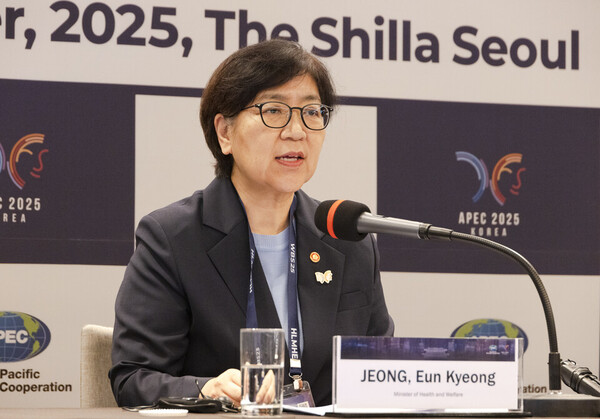Countries in the Asia-Pacific region agreed to actively cooperate in areas such as responding to future aging, ensuring the sustainability of healthcare systems, utilizing digital health and AI, and promoting mental health.
The Ministry of Health and Welfare announced Tuesday that a joint declaration containing these points was adopted at the 15th High-Level Meeting on Health and Economy (HLMHE) of the Asia-Pacific Economic Cooperation (APEC).
This ministerial-level meeting, hosted by Korea as this year's APEC Summit chair, was presided over by Minister of Health and Welfare Jeong Eun-kyeong.

About 480 officials attended, including ministers and vice ministers from 21 member economies, representatives from international organizations, such as the World Health Organization's Western Pacific Regional Office (WHO WPRO), the Organization for Economic Cooperation and Development (OECD), and the Asian Development Bank (ADB), as well as business leaders.
Based on the discussions among the 21 member economies, a joint statement was adopted. The joint statement covered a wide range of topics, including: responding to aging populations; enhancing the sustainability and accessibility of healthcare systems; utilizing digital health and artificial intelligence; community-based care; strengthening health supply chains; cancer and women's health; promoting mental health; responding to environmental changes and disasters; and preparing for future health crises.
Regarding aging, member economies agreed to recognize older adults not as objects of protection but as social and economic actors, and to support the APEC Framework for Responding to Demographic Changes led by Korea. To ensure the sustainability of healthcare systems, they committed to expanding access to essential services, increasing financial resources, improving governance, and strengthening the use of digital health technologies and public-private partnerships.
Concerning the adoption of digital health and AI, while acknowledging the positive effects, such as early diagnosis and personalized treatment, the participants made it clear that institutional safeguards, including the protection of personal information, must be implemented concurrently.
Alongside this, consensus was formed on the need to expand community care to provide integrated medical, nursing, and daily living support. The vulnerability of health supply chains exposed by the Covid-19 pandemic was also discussed. Accordingly, member economies agreed that supply chain diversification is necessary to ensure the stable supply of essential medicines, vaccines, and diagnostic devices.
Regarding cancer and women's health, they agreed to expand cooperation across the entire cycle, from cancer prevention and early screening to treatment and palliative care. They reaffirmed the eradication of cervical cancer and the promotion of women's health as core tasks of Asia-Pacific health cooperation.
On the mental health agenda, efforts to expand services, promote early intervention, and reduce stigma were emphasized. Furthermore, considering the impact of extreme weather and natural disasters on infectious and chronic diseases, they agreed to strengthen international and multisectoral cooperation.
Additionally, to prepare for future health crises, they committed to establishing a multisectoral surveillance system and promoting research collaboration to enhance regional and international response capabilities.
“This joint statement will serve as an important milestone for the 21 member economies of the Asia-Pacific region as we move forward together toward a sustainable future,” Minister Jeong said.
Related articles
- Korea hosts 1st APEC high-level meeting on health and economy alongside World Bio Summit
- IVI to host meeting on adult vaccination strategies at APEC/WBS event
- Haeundae Paik Hospital named as partner hospital for 2025 APEC Summit
- Roche flags APAC vision crisis as Korea sees rise in eye disease from aging, diabetes
- National screening policy is key to eradicating cervical cancer: NCC study

